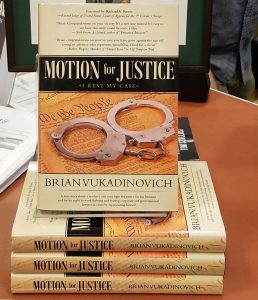Motion for Justice, Brian Vukadinovich’s long-awaited new book, has hit the shelves.
Brian is an advisor, a friend, and a popular member of Courtroom5’s pro se community. Our members know him as an extremely knowledgeable litigator and generous contributor. You’ve hit the jackpot in Courtroom5’s community when Brian Vukadinovich pops in to discuss your case.
He’s also an infrequent blogger at Courtroom5, but he’s too humble to plug his own book here. I’m happy to do it for him.
One could say Brian has been working on this book for a lifetime. His introduction to the justice system came decades ago, when he was arrested as a young man for the crime of standing outside a bank with his mom. His story is an indictment of the entire U.S. justice system — from the beat cop to the Supreme Court — backed up by a fascinating chronicle of his own experiences. I especially enjoyed the detailed descriptions of his courtroom procedures and the thinking that drove his case strategies.
It’s a great read, particularly for pro se litigants and others who still believe justice can be found in the courts. The Chicago Tribune’s review noted that Brian held nothing back. Despite his own success, such beliefs are pure fantasy, according to Brian Vukadinovich:
I am pleased to announce the recent release of my book, Motion For Justice – I Rest My Case. My book chronicles many injustices I had to face in my adult life in dealing with unsavory lawyers and a corrupt judiciary. I spent many years trying to get justice for wrongs that were committed against me by corporations and government agencies regarding my right to work as a teacher and to be free of retaliatory police harassment and brutality. I hope my book raises awareness of the obstacles for people trying to obtain justice in a very unfair court system that overly protects corporations and government agencies in the United States that have violated the rights of the people. My book also discusses how I won a federal jury trial in March 2016 against my former public school corporation employer in Indiana. I represented myself at a five-day jury trial and beat the corporation and its team of lawyers. The jury determined that the corporation violated my due process rights and awarded me significant damages.
My book discusses how the federal judge in the case went out of his way to make it difficult for me to win my case, simply because I was pro se. I hope my book draws attention to the unfairness of the legal profession and judiciary, and that it effects some positive change.
— Brian Vukadinovich
Brian Vukadinovich is serious about justice, and that makes him serious about the courts, the institution in our country primarily responsible for justice. I hope there are people in that institution willing to hear what Brian has to say.
Motion for Justice by Brian Vukadinovich is available on Amazon and at Barnes & Noble. Get your copy now! And read more of Brian’s story below.
Backstory: Shop Teacher Brian Vukadinovich Sues School Board And Wins
In 2013, shop teacher Brian Vukadinovich filed suit against the school board in Hanover Township, Indiana, claiming they’d fired him unfairly. His lawsuit sought damages for age discrimination, retaliation for a previous lawsuit, and violation of his rights in the termination process. Early this month, a federal jury rendered a verdict in his favor. He had no one to thank but himself. That’s right, Brian Vukadinovich represented himself, from the moment he filed that multi-count complaint to the moment the jury’s verdict came down on March 10th.
After a weeklong trial, the jury awarded him $203,840 in damages on his due-process claim. Brian was hired at Hanover Central High School in 2004 as an industrial arts (shop) teacher. His position was eliminated in 2012, when he was 60 years old. That decision came at the end of several tense months of dispute with school administrators over whether his classes met state standards.
After he showed up at a school board meeting and threatened to sue each and every member of the board, several attorneys offered to represent him. Brian turned them all down. He chose to represent himself in the case because he’d been studying the law for 30 years and had more experience in court than many lawyers. He also had little faith in members of the bar.
Early in his teaching career, Brian had filed a grievance against school administrators that ended up in arbitration. When the school’s lawyer double-crossed him — an essential experience for any self-trained litigant — he decided to do better next time. He read a dictionary of legal terms and other legal texts. He learned legal research during a short stint working for a law firm. He attended trials to learn oral argument and advocacy. Much later, he sued another school board and settled the case on favorable terms.
Brian Vukadinovich has sued aplenty and lost aplenty, including:
- an employment discrimination suit when he was passed over for a younger, less experienced candidate,
- a suit against another school board in Indiana that terminated his teaching contract,
- suits for defamation and failure to provide medical care after a DUI arrest,
- a suit for false arrest and excessive force in a different incident,
- a suit over the costs of collecting attorney’s fees for a lawsuit deemed frivolous.
Brian has been fired from almost every teaching job he’s ever held and has sued many of his employers, sometimes without good cause. This time, he went to court with several powerful claims. In this latest case, both sides had tried to avoid trial with opposing summary judgment motions. The judge denied both motions in September and set the case for trial, but there were so many pre-trial filings that the case was continued until March.
Some of Brian’s claims were struck during this process, but he’d gathered enough evidence in discovery to put his primary claims in front of a jury. “I am very grateful that the court had an opportunity to review the evidence and determined that there was sufficient evidence to proceed to trial on my discrimination claims and federal due process claims. I very much look forward to now presenting my evidence to a jury,” Brian said last year.
This month, he presented his case in the Indiana Northern District Court before Judge Philip P. Simon — and a jury of his peers — and he won! Despite the challenges, Brian feels more people should consider representing themselves in court. “I think that most people, if they would just think about what happened, I think they can go to trial and win these cases,” he said. “Just speak from the heart and speak the truth.”
That’s easy to say with 30 years’ experience and a sweet victory under his belt, but he’s right. With a little organization, good practice on legal research and writing, and a healthy dose of moral support, most people can represent themselves skillfully. I’m glad to hear about Brian’s win. With all the bad news on pro se litigants, we have to celebrate our heroes whenever we can. All of us here at Courtroom5 offer a hearty congratulations to Brian Vukadinovich on his victory.
Brian Vukadinovich Is Not A Lawyer But He Plays One In Court
Brian Vukadinovich represents himself in court better than most lawyers could, and he has receipts. Brian is not a lawyer, but I can’t think of anyone in the business of litigation who deserves more applause.
In 2013, Brian sued an Indiana school board and several school administrators for due process violations when they refused to renew his teaching contract. I shared his story earlier this year, when he’d just completed the jury trial. Two weeks ago, the judge in the case issued a final order blasting the school board, and it’s a doozy.
Among other sharp passages, Chief Judge Philip Simon of the U.S. Northern District of Indiana wrote this:
Based on the evidence presented at trial, a reasonable jury could have found that the process afforded Vukadinovich was insufficient to satisfy the requirements of due process. One glaring issue for the defendants at trial was the fact that no one could point to the clear, uncontested, and uncontradicted reason that Vukadinovich was terminated. In fact, the testimony of the defense’s key witnesses – Biggs and Kaiser – was inconsistent and, at times, nonsensical. The evidence showed that the School was playing a game of Whack-a-Mole with Vukadinovich – they would tell him one reason for his termination and when he would try to dispel it, they would then come up with another reason. The problem with the School’s wishy-washy explanation of the reason for Vukadinovich’s termination was magnified at trial when the jury was able to consider the credibility of Biggs and Kaiser. Recall that Vukadinovich was acting pro se, and when he was questioning Kaiser and Biggs, they were both extremely evasive and combative, often responding to his questions with a query of their own or by repeatedly asking him to define what are otherwise commonplace terms. It was an excruciating exercise to observe, especially when they put up no such fight when questioned by defense counsel. These theatrics were not only distracting and off putting, but they also added flavor to the argument that the reasons the defendants gave for Vukadinovich’s termination were pretextual. To put it bluntly, after several years of presiding over this litigation, including a five day jury trial, I cannot tell you why Vukadinovich was terminated. The jury surely must have sympathized with Vukadinovich, who simply wanted a straight-forward explanation for why he was being let go. In the end, it was reasonable for a jury to look at the mess of contradictory evidence and courtroom theatrics and conclude that Vukadinovich was not given a sufficient explanation of the reasons for the decision to potentially terminate him and, therefore, a meaningful opportunity to respond, all in violation of his right to due process.
Every victory like this makes the next judge we face more receptive, less biased, more capable of giving us a fair hearing. I’ve told Brian that if more of us could handle a courtroom the way he does, we’d have a justice system that worked for everyone. He’s far too experienced at pro se litigation to need Courtroom5’s services, but he has kind words for us nevertheless.
Here’s what Brian wants you to know:
I was able to represent myself and win a major jury trial in federal court resulting in a six figure verdict against my former employer for violating my federal due process rights but it was very difficult. I felt confident that I would be able to win my case because I had substantial years of experience in pro se litigation and I knew what to expect. I am well aware of the great services offered by Courtroom5 and I would highly recommend that any persons thinking about representing themselves in court contact Courtroom5 for the proper guidance you will need to successfully represent yourself in court.
— Brian Vukadinovich
Brian has some projects in the works that may help self-represented litigants perform better, but they’re not ready for public disclosure yet and I won’t scoop him. Just know you can expect to hear about it here first! Thanks to Brian Vukadinovich for being a model pro se litigant, and for making sure there’s at least one federal judge in Indiana who knows what we can do.
Brian Vukadinovich on Pro Se Nation TV
Pro Se Nation is a half-hour program that airs on Princeton (NJ) community television each week. It highlights some of the struggles in getting justice when you’re in court without a lawyer.
Host MaryLynn Schiavi knows the experience all too well. In 2007, she lost her job in what she considered unfair circumstances, so she sued. She managed to get a summary judgment for the defendant overturned on appeal but then lost the case in a jury trial. Her pro se appeal of that judgment ended with a per curiam affirmance. (Ouch! Those are the worst.)
As I know too well, a painful loss in court can make you dedicate your career to correcting and preventing injustices.
Brian and MaryLynn covered a lot of ground in their half-hour interview:
- An overview of Brian’s federal case, why it took so long to complete, and why he chose to go pro se.
- The reaction of his adversaries when he won the case.
- What he learned about litigation and his treatment by court personnel.
- The kinds of cases that are more suitable for pro se’s to handle.
- Advice to those considering going pro se, and the most important things to keep in mind.
- Suggested changes to the American legal system that could improve the experience for pro se litigants.
The program premiered on May 17, 2018. It’s great to see the problems of pro se litigants discussed in the media. It’s even better to see our successes.



